奇異豬籠草
奇異豬籠草(学名:)是分布最为广泛猪笼草属植物。[18]:61其种加词“mirabilis”来源于拉丁文,意为“奇异的,令人惊叹的”。其是豬籠草属中分布最为广泛的物种,其分布范围覆盖东南亚、马来群岛的主要岛屿(除开小巽他群岛及菲律宾北部地区),并一直北延至中国南部,南延至澳大利亚。[1]猪笼草属中,奇異豬籠草具有最多的变型和变种,其中最知名的为汶萊以及沙撈越特有的变种——棘口奇异猪笼草(N. mirabilis var. echinostoma),其具有极宽的唇。[2]。
| 奇異豬籠草 | |
|---|---|
.jpg.webp) | |
| 奇異豬籠草的上位笼 | |
| 科学分类 | |
| 界: | 植物界 Plantae |
| 演化支: | Tracheophyta |
| 演化支: | 被子植物 Angiosperms |
| 演化支: | 真双子叶植物 Eudicots |
| 目: | 石竹目 Caryophyllales |
| 科: | 猪笼草科 Nepenthaceae |
| 属: | 猪笼草属 Nepenthes |
| 种: | 奇異豬籠草 N. mirabilis |
| 二名法 | |
| Nepenthes mirabilis | |
 | |
| 奇異豬籠草的分佈地 | |
| 異名 | |
非正式名
| |
奇异猪笼草的叶片和捕虫笼质地柔软,捕虫笼耐久性不佳,易枯萎。在杂交中,其捕虫笼形态与质地的性状强势,仅在维多利亚时代常用于育种,现已极少使用。[18]:61
部分早期中文文献也把奇异猪笼草直接称作猪笼草,至今仍有部分书籍沿用此称,但已不被食虫植物栽培者所提倡。
奇異豬籠草已被世界自然保護聯盟列入《2006年世界自然保護聯盟瀕危物種紅色名錄》中,保护状况为無危[19]。在香港,奇異豬籠草受香港法例第96章《林區及郊區條例》保護。
形态特征

奇异猪笼草为直立草本或攀援藤本,高0.5至2米。莲座状植株的叶片密集,近无柄,基部半抱茎,呈披针形,长约10厘米,边缘呈流苏状。笼蔓短于叶片。攀援茎的叶片散生,具柄,呈长圆形或披针形,长10至25厘米。叶基下延,全缘或为流苏状,两面常具紫红色斑点,中脉两侧各具纵脉4至8条,笼蔓约与叶片等长,具上位笼或否。[20]
奇异猪笼草的下位笼高约2至6厘米,为狭卵形或近圆柱形,被疏柔毛和星状毛。腹面具一对笼翼,笼翼具翼须。笼盖基部的后方的笼蔓尾分叉,分2至8条。笼盖为卵形或近圆形,其内表面密布近圆形的腺体。[20]
奇异猪笼草的上位笼高8至16厘米,近圆筒形,下部稍扩大,笼口处缩窄或否。被疏毛、分叉毛和星状毛。笼翼缩小为一对隆起。唇宽约0.2宽0.4厘米,内表面上半部为蜡质区,下半部密生火山口状腺体。笼蔓尾二叉。笼盖为卵形或长圆形,下表面具密集的近圆形腺体。[20]
奇异猪笼草的花序为总状花序,长20至50厘米。被长柔毛,与叶对生或顶生。花梗长0.5至1.5厘米。花被片4片,红至紫红色,椭圆形或长圆形,背面被柔毛,腹面密被近圆形腺体。雄花的花被片长0.5至0.7厘米,雄蕊柄具花药1轮,稍扭转。雌花的花被片长0.4至0.5厘米。子房椭圆形,具短柄或近无柄,密被淡黄色柔毛或星状毛。蒴果栗色,长0.5至3厘米;果爿4片,狭披针形。种子丝状,长约1.2厘米。花期为4至11月,果期为8至12月。[20]
分布范围
奇异猪笼草分布广泛,其存在于澳大利亚(约克角半岛)、婆羅洲、蘇門答臘、柬埔寨、加罗林群岛(帕劳及雅蒲島)、中国(广东省、海南省[21][22]、香港、澳门及橫琴)、當特爾卡斯托群島、爪哇、老挝、路易西亚德群岛、摩鹿加群島、緬甸、新幾內亞、西马来西亚、菲律賓(迪纳加特岛及棉兰老岛)、蘇拉威西島、苏门答腊岛、泰國及越南。[1][18]:61[23][24][25][26][27][28][29]
此外,其也存在于许多小型岛屿中,包括巴比岛、邦加島、巴尼亞群島、巴圖群島、望加丽岛、恩加诺岛、兰塔岛、达鲁岛、浮罗交怡、孟德尔岛、明打威群島(北巴蓋島、西比路島、南巴蓋島)、美兰地群岛(巴東島、朗桑島、直名丁宜島)、尼亞斯島、槟榔屿、廖内群岛(林加群島、廖内岛)、魯帕島[30]、塔威塔威[31],也可能存在于沃沃尼島[32]。
相关物种
奇异猪笼草与澳大利亚特有的罗恩猪笼草(N. rowanae)和细猪笼草(N. tenax)之间存在着密切的近缘关系。
| 奇异猪笼草与罗恩猪笼草之间形态特征的区别(Clarke & Kruger, 2005) | ||
| 形态特征 | 奇异猪笼草 | 罗恩猪笼草 |
|---|---|---|
| 叶片形态 | 急尖至圆形 | 叶尖缩小,笼蔓处仍有延伸出来的窄细末端 |
| 笼蔓与叶片的衔接处 | 位于末端 | 盾形 |
| 笼翼 | 单一,具翼须 | 翼须呈“T”形 |
| 叶片质地 | 通常为纸质 | 强韧的革质 |
| 叶片基部 | 简单或下延至节间距的三分之一 | 下延超过节间距的二分之一 |
| 捕虫笼下部的消化腺密度 | 1600至2500个每平方厘米 | 约3600个每平方厘米 |
| 上位笼的笼肩位置 | 中间靠下 | 上四分之一处 |
| 下位笼的笼肩位置 | 下三分之一到四分之一处 | 唇下 |
在食虫植物数据库中,分类学家简·斯洛尔(Jan Schlauer)将空堪达猪笼草(N. kongkandana)列为奇异猪笼草的同物异名。[33]
种下类群
奇异猪笼草的捕虫笼在形态和颜色方面具有非常大的可变性,同时也是猪笼草属内存在最多同物异名的物种。[34]以下是已被描述的奇异猪笼草的变型和变种。棘口奇异猪笼草和球状奇异猪笼草(N. mirabilis var. globosa)的命名现在被视为是无效的。
- Nepenthes mirabilis f. anamensis (Hort.Weiner) Hort.Westphal (1991)
- Nepenthes mirabilis var. anamensis Hort.Weiner in sched. (1985) nom.nud.
- Nepenthes mirabilis var. biflora J.H.Adam & Wilcock (1992)
- Nepenthes mirabilis var. echinostoma (Hook.f.) Hort.Slack ex J.H.Adam & Wilcock (1992)
- Nepenthes mirabilis var. globosa M.Catal. (2010)[35]
- Nepenthes mirabilis f. simensis (Hort.Weiner) Hort.Westphal (1991)
- Nepenthes mirabilis var. simensis Hort.Weiner in sched. (1985) nom.nud.
- Nepenthes mirabilis f. smilesii (Hemsl.) Hort.Westphal (2000)
- Nepenthes mirabilis var. smilesii (Hemsl.) Hort.Weiner in sched. (1985)


棘口奇异猪笼草
棘口奇异猪笼草仅存在于婆罗洲西部。其生长势与对环境的适应性不如原变型。[18]:771865年,奥多阿多·贝卡利发现了棘口奇异猪笼草。1873年,约瑟夫·道尔顿·胡克将其描述为一个物种——棘口猪笼草(N. echinostoma)。[36]1882年,弗雷德里克·威廉·伯比奇在他的著作《园丁纪事》中对其进行了描述。[注 2][36][37]
球状奇异猪笼草
球状奇异猪笼草存在于攀牙府附近安达曼海上的一个为未公开岛屿及泰国董里市附近。[1][35]
其分类曾存在争议,一部分人认为其为独立物种,另一部分人则认为其是一个自然杂交种。[18]:72该变种最早出现于2006年1月的《食虫植物研究会杂志》封面上,其被标注为“Nepenthes sp. from Thailand”。[38]球状猪笼草(N. globosa)一词最早出现在仓田重夫一篇刊登于2007年7月《食虫植物研究会杂志》的文章中。[15]同期,多田雅宏也发表了一篇文章,将该类群描述为海盗猪笼草(N. sp. viking)。[17]在马尔切洛·卡塔拉诺的描述发表前,该类群在斯图尔特·麦克弗森2009的专著《旧大陆的猪笼草》中也被称为攀牙猪笼草(Nepenthes sp. Phanga Nga)。[1]
在园艺贸易中,该变种常被称为球状猪笼草和海盗猪笼草。[1][39]其被称为海盗猪笼草,是因为其捕虫笼类似于海盗船的船头。[40]
共生生物
已在奇异猪笼草的捕虫笼中发现了大量的共生生物。包括分布于澳大利亚的奇异猪笼草捕虫笼中的巴布亚麻蝇(Sarcophaga papuensis)和瓦氏猪笼草螨(Nepenthacarus warreni)。[41][42]此外,在帛琉和雅蒲島的奇异猪笼草捕虫笼中分别发现于两种伊蚊(Aedes dybasi和Aedes maehleri)。[43]这些昆虫都具有特殊的生活史和与此习性相关的形态特征。[44][45]
存在于泰国奇异猪笼草捕虫笼中的奇异线虫(Baujardia mirabilis)已被描述。在奇异猪笼草的捕虫笼中发现这种线虫并不是一个偶然;其捕虫笼已成为了奇异线虫的天然栖息地。孑孓和奇异线虫主导着捕虫笼中的微生态系统。据推测,这种线虫与一种或多种共生昆虫间存在着携播关系。[46]
在中国南部,曾观察到树蛙在奇异猪笼草的捕虫笼中栖息。这些树蛙并不是猪笼草的猎物,而会在捕食猪笼草内捕食昆虫。[47]它们不受强酸性的消化液的影响(其pH值可低至2),可能是由于其具有皮肤表面粘液的隔离。[48]
在澳大利亚贾丁河沿岸生长的奇异猪笼草,在其捕虫笼中发现了一种特殊的水生真菌。其菌丝自由生活于消化液中,或附着于捕虫笼内昆虫的几丁质外壳上。[49][50]
自然杂交种
奇异猪笼草是猪笼草属中已知自然杂交种最多的物种。以下是已发现的奇异猪笼草的自然杂交种。[1]
- ? (N. alata × N. merrilliana) × N. mirabilis [=N. × tsangoya][52]
- N. alata × N. mirabilis [=N. × mirabilata][3][53]
- N. ampullaria × N. mirabilis [=N. × kuchingensis, Nepenthes cutinensis][2]
- ? (N. ampullaria × N. rafflesiana) × N. mirabilis [=N. × hookeriana × N. mirabilis][54]
- N. andamana × N. mirabilis[55](包括N. andamana × N. mirabilis var. globosa)[55]
- N. benstonei × N. mirabilis[4]
- N. bicalcarata × N. mirabilis[1](包括N. bicalcarata × N. mirabilis var. echinostoma)[2]
- ? (N. bicalcarata × N. rafflesiana) × N. mirabilis var. echinostoma[2]
- N. gracilis × N. mirabilis [=N. × sharifah-hapsahii, N. × ghazallyana, N. × grabilis, N. neglecta?][1][2][56]
- N. insignis × N. mirabilis[57]
- N. kampotiana × N. mirabilis[55]
- N. kongkandana × N. mirabilis[55]
- N. merrilliana × N. mirabilis[1]
- N. mirabilis × N. northiana[58][59]
- N. mirabilis × N. rafflesiana[2](包括N. mirabilis var. echinostoma × N. rafflesiana)[18]:87[59]
- N. mirabilis × N. reinwardtiana[59]
- N. mirabilis × N. rowanae[60]
- N. mirabilis × N. smilesii[61]
- N. mirabilis × N. spathulata[4]
- N. mirabilis × N. sumatrana[1]
- N. mirabilis × N. tenax[1]
- ? N. mirabilis × N. thorelii[62][63][64]
- N. mirabilis × N. tomoriana[1]
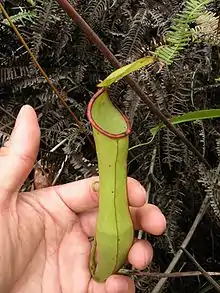 沙礼花-哈萨猪笼草
沙礼花-哈萨猪笼草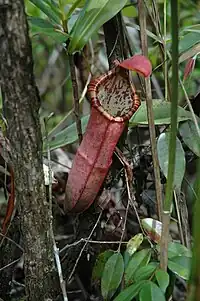 奇异猪笼草与诺斯猪笼草的自然杂交种
奇异猪笼草与诺斯猪笼草的自然杂交种 奇异猪笼草与莱佛士猪笼草的自然杂交种
奇异猪笼草与莱佛士猪笼草的自然杂交种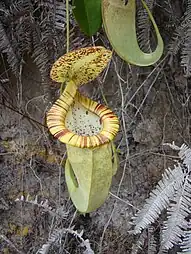 棘口奇异猪笼草与莱佛士猪笼草的自然杂交种
棘口奇异猪笼草与莱佛士猪笼草的自然杂交种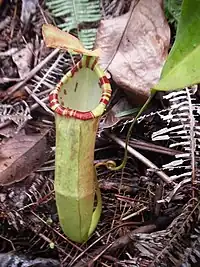 奇异猪笼草与苏门答腊猪笼草的自然杂交种
奇异猪笼草与苏门答腊猪笼草的自然杂交种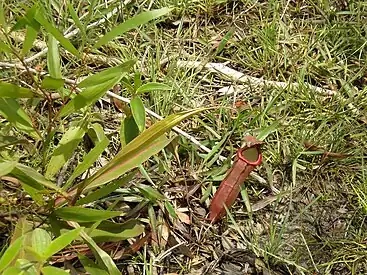 ?奇异猪笼草与高棉猪笼草的自然杂交种
?奇异猪笼草与高棉猪笼草的自然杂交种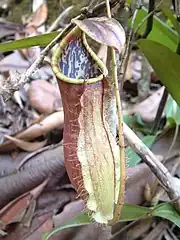 ?奇异猪笼草与托莫里猪笼草的自然杂交种
?奇异猪笼草与托莫里猪笼草的自然杂交种 奇異豬籠草的雄花
奇異豬籠草的雄花
注释
- 若昂·德理路在1790年将奇异猪笼草最先描述为Phyllamphora mirabilis。1805年,卡尔·路德维希·韦尔登诺将其移至猪笼草属下,并错误的组成为Nepenthes phyllamphora。大部分文献都显示[1][2][3][4][5],乔治·克拉里奇·德鲁斯于1916年最先发表了正确的二名学名Nepenthes mirabilis[6],但在食虫植物数据库中,简·斯洛尔(Jan Schlauer)将最早发表者注为1869年的Rafarin[7]。
- 弗雷德里克·威廉·伯比奇在他的著作《园丁纪事》中的原文:[36][37]
Beccari's singular N. echinostoma (vide Herb. Kew) is a wonderful thing, as yet unintroduced—indeed, I suppose unseen by any save Beccari ! The mouths of the urns remind one of the deflexed teeth of some gigantic moss of the Hypnoid section.
參考文献
- McPherson, S.R. 2009. Pitcher Plants of the Old World. 2 volumes. Redfern Natural History Productions, Poole.
- Clarke, C.M. 1997. Nepenthes of Borneo. Natural History Publications (Borneo), Kota Kinabalu.
- Cheek, M.R. & M.H.P. Jebb 2001. Nepenthaceae. Flora Malesiana 15: 1–157.
- Clarke, C.M. 2001. Nepenthes of Sumatra and Peninsular Malaysia. Natural History Publications (Borneo), Kota Kinabalu.
- Danser, B.H. 1928. The Nepenthaceae of the Netherlands Indies. Bulletin du Jardin Botanique de Buitenzorg, Série III, 9(3–4): 249–438.
- Druce, G. 1916. Nepenthes mirabilis. In: Botanical Exchange Club of the British Isles Report 4: 637.
- Schlauer, J. N.d. Nepenthes mirabilis. Carnivorous Plant Database.
- Danser, B.H. 1928. 1. Nepenthes alata Blanco (页面存档备份,存于). [pp. 258–262] In: The Nepenthaceae of the Netherlands Indies. Bulletin du Jardin Botanique de Buitenzorg, Série III, 9(3–4): 249–438.
- Cheek, M. & M. Jebb 2013. Typification and redelimitation of Nepenthes alata with notes on the N. alata group, and N. negros sp. nov. from the Philippines. Nordic Journal of Botany, published online on August 22, 2013. doi:10.1111/j.1756-1051.2012.00099.x
- Clarke, C. & C.C. Lee 2012. A revision of Nepenthes (Nepenthaceae) from Gunung Tahan, Peninsular Malaysia. (页面存档备份,存于) Gardens' Bulletin Singapore 64(1): 33–49.
- Schlauer, J. N.d. Nepenthes alata (页面存档备份,存于). Carnivorous Plant Database.
- Bailey, F.M. 1881. On a new species of Nepenthes (页面存档备份,存于). The Proceedings of the Linnean Society of New South Wales 5: 185–187.
- (拉丁文) Hooker, J.D. 1873. Ordo CLXXV bis. Nepenthaceæ. In: A. de Candolle Prodromus Systematis Naturalis Regni Vegetabilis 17: 90–105.
- (拉丁文) Blume, C.L. 1852. Ord. Nepenthaceae. (页面存档备份,存于) In: Museum Botanicum Lugduno-Batavum, sive stirpium exoticarum novarum vel minus cognitarum ex vivis aut siccis brevis expositio. Tom. II. Nr. 1. E.J. Brill, Lugduni-Batavorum. pp. 5–10.
- (日語) Kurata, S. 2007. ネペンテス ・ ノート (XIV) — Nepenthes globosa のネーミングについて (页面存档备份,存于). Journal of Insectivorous Plant Society 58(3): 76.
- Macfarlane, J.M. 1908. Nepenthaceae. In: A. Engler. Das Pflanzenreich IV, III, Heft 36: 1–91.
- (日語) Tada, M. 2007. 日本における Nepenthes Viking の渡来と現状について (页面存档备份,存于). Journal of Insectivorous Plant Society 58(3): 75.
- 夏洛特. . 台北: 商周出版. 2007. ISBN 978-986-124-850-9.
- Clarke et al. . The IUCN Red List of Threatened Species 2000. [12 May 2006].
- 阮云珍. 1984. 中国植物志. 猪笼草 (页面存档备份,存于) 北京: 科學出版社. 34(1): 12.
- Nepenthes mirabilis (页面存档备份,存于). Flora of China.
- (中文) 杨光穗, 黄少华, 徐世松, 高艳梅. 2006. 海南岛野生猪笼草资源调查及其营养成分分析 (页面存档备份,存于). 中国农学通报. 22(11): 440–442.
- Slack, A. 1979. Nepenthes mirabilis. In: Carnivorous Plants. Ebury Press, London. pp. 79–80.
- McPherson, S.R. & V.B. Amoroso 2011. Field Guide to the Pitcher Plants of the Philippines. Redfern Natural History Productions, Poole.
- McPherson, S.R. & A. Robinson 2012. Field Guide to the Pitcher Plants of Borneo. Redfern Natural History Productions, Poole.
- McPherson, S.R. & A. Robinson 2012. Field Guide to the Pitcher Plants of Sulawesi. Redfern Natural History Productions, Poole.
- McPherson, S.R. & A. Robinson 2012. Field Guide to the Pitcher Plants of Peninsular Malaysia and Indochina. Redfern Natural History Productions, Poole.
- McPherson, S.R. & A. Robinson 2012. Field Guide to the Pitcher Plants of Australia and New Guinea. Redfern Natural History Productions, Poole.
- McPherson, S.R. & A. Robinson 2012. Field Guide to the Pitcher Plants of Sumatra and Java. Redfern Natural History Productions, Poole.
- Clarke, C.M. 2001. Appendix C: Distribution Maps. In: Nepenthes of Sumatra and Peninsular Malaysia. Natural History Publications (Borneo), Kota Kinabalu. pp. 299–307.
- Cheek, M. & M. Jebb 2013. Recircumscription of the Nepenthes alata group (Caryophyllales: Nepenthaceae), in the Philippines, with four new species. European Journal of Taxonomy 69: 1–23. doi:10.5852/ejt.2013.69
- (印尼文) Sunarti, S., A. Hidayat & Rugayah 2008. Keanekaragaman tumbuhan di hutan Pegunungan Waworete, Kecamatan Wawonii Timur, Pulau Wawonii, Sulawesi Tenggara. (页面存档备份,存于) [Plants diversity at the mountain forest of Waworete, East Wawonii District, Wawonii Island, Southeast Sulawesi.] Biodiversitas 9(3): 194–198.
- Schlauer, J. N.d. Nepenthes kongkandana (页面存档备份,存于). Carnivorous Plant Database.
- Catalano, M. 2009. Nepenthes. In: Growing Carnivores — an Italian perspective. Prague. pp. 50–57.
- Catalano, M. 2010. Nepenthes mirabilis var. globosa M. Catal. var. nov.PDF In: Nepenthes della Thailandia: Diario di viaggio. Prague. p. 40.
- Phillipps, A. & A. Lamb 1996. Pitcher-Plants of Borneo. Natural History Publications (Borneo), Kota Kinabalu.
- Burbidge, F.W. 1882. Notes on the new Nepenthes (页面存档备份,存于). The Gardeners' Chronicle, new series, 17(420): 56.
- (日語) Cover of the January 2006 issue of the Journal of Insectivorous Plant Society (页面存档备份,存于). Insectivorous Plant Society.
- Mey, F.S. 2011. Nepenthes mirabilis var. globosa, a popular plant? (页面存档备份,存于). Strange Fruits: A Garden's Chronicle, December 24, 2011.
- Guerini, M. 2011. 2010: new species of Carnivorous Plants.PDF Associazione Italiana Piante Carnivore.
- Yeates, D.K., H. de Souza Lopes & G.B. Monteith 1989. A commensal sarcophagid (Diptera: Sarcophagidae) in Nepenthes mirabilis (Nepenthaceae) pitchers in Australia. Australian Entomological Magazine 16: 33–39.
- Fashing, N.J. 2002. Nepenthacarus, a new genus of Histiostomatidae (Acari: Astigmata) inhabiting the pitchers of Nepenthes mirabilis (Lour.) Druce in Far North Queensland, Australia.PDF (1.64 MB) Australian Journal of Entomology 41(1): 7–17. doi:10.1046/j.1440-6055.2002.00263.x
- Sota, T. & M. Mogi 2006. Origin of pitcher plant mosquitoes in Aedes (Stegomyia): a molecular phylogenetic analysis using mitochondrial and nuclear gene sequences. Journal of Medical Entomology 43(5): 795–800. doi:10.1603/0022-2585(2006)43[795:OOPPMI]2.0.CO;2
- Bohart, R.M. 1956. Insects of Micronesia. Diptera: Culicidae.PDF Insects Micronesia 12(1): 1–85.
- Mogi, M. 2010. Unusual life history traits of Aedes (Stegomyia) mosquitoes (Diptera: Culicidae) inhabiting Nepenthes pitchers. Annals of the Entomological Society of America 103(4): 618–624. doi:10.1603/AN10028
- Bert, W., I.T. De Ley, R. Van Driessche, H. Segers & P. De Ley 2003. Baujardia mirabilis gen. n., sp. n. from pitcher plants and its phylogenetic position within Panagrolaimidae (Nematoda: Rhabditida).PDF Nematology 5(3): 405–420. doi:10.1163/156854103769224395
- Hua, Y. & H. Li 2005. Food web and fluid in pitchers of Nepenthes mirabilis in Zhuhai, China.PDF Acta Botanica Gallica 152(2): 165–175.
- Hua, Y. & L. Kuizheng 2004. The Special Relationship Between Nepenthes and Tree Frogs.PDF Carnivorous Plant Newsletter 33(1): 23–24.
- Cribbs, A.B. 1987. An aquatic fungus from pitchers of Nepenthes mirabilis. Queensland Naturalist 28: 72–73.
- Schnell, D.E. 1992. Literature Review. Carnivorous Plant Newsletter 21(3): 80–82.
- Yogiara, A. Suwanto & M.T. Suhartono 2006. A complex bacterial community living in pitcher plant fluid (页面存档备份,存于). Jurnal Mikrobiologi Indonesia 11(1): 9–14.
- Lauffenburger, A. 1995. Guide to Nepenthes Hybrids (页面存档备份,存于). OmnisTerra.
- Kurata, S. & M. Toyoshima 1972. Philippine species of Nepenthes. The Gardens' Bulletin Singapore 26(1): 155–158. Abstract (页面存档备份,存于)
- Lowrie, A. 1983. Sabah Nepenthes Expeditions 1982 & 1983.PDF (1.25 MB) Carnivorous Plant Newsletter 12(4): 88–95.
- (意大利文) Catalano, M. 2010. Nepenthes della Thailandia: Diario di viaggio. Prague.
- Fretwell, S. 2013. Back in Borneo to see giant Nepenthes. Part 2: Mt Tambuyukon and Poring. Victorian Carnivorous Plant Society Journal 108: 6–15.
- Rischer, H. 1995. Observations on the Nepenthes species of Irian Jaya, Part I: Nepenthes insignis Danser.PDF (461 KB) Carnivorous Plant Newsletter 24(3): 75–77.
- Lee, C.C. 2007. Re: The most accessible limestone hill of Bau (页面存档备份,存于). Carnivorous Plants in the tropics.
- Phillipps, A., A. Lamb & C.C. Lee 2008. Pitcher Plants of Borneo. Second Edition. Natural History Publications (Borneo), Kota Kinabalu.
- Clarke, C.M. & R. Kruger 2005. Nepenthes rowanae (Nepenthaceae), a remarkable species from Cape York, Australia (页面存档备份,存于). Carnivorous Plant Newsletter 34(2): 36–41.
- Mey, F.S., L.H. Truong, D.V. Dai & A.S. Robinson 2011. Nepenthes thorelii, an emended description and novel ecological data resulting from its rediscovery in Tay Ninh, Vietnam. In: McPherson, S.R. New Nepenthes: Volume One. Redfern Natural History Productions, Poole. pp. 104–131.
- Bednar, B. 1983. Nepenthes mirabilis variation.PDF (111 KB) Carnivorous Plant Newsletter 12(3): 64.
- N. thorelii rediscovered (页面存档备份,存于). Carnivorous Plants in the tropics.
- Mey, F.S. 2012. Virtual Nepenthes herbarium on "Europeana" (页面存档备份,存于). Strange Fruits: A Garden's Chronicle, December 19, 2012.
- [Anonymous] 1877. Reports of Societies. Royal Horticultural(页面存档备份,存于). The Gardeners' Chronicle 8(197): 441.
- [Anonymous] 2010. Eramet-PT Weda Bay Nickel Exploration and Development ESIA.(页面存档备份,存于) ERM Indonesia, Jakarta.
- Adam, J.H. 1997. Prey spectra of Bornean Nepenthes species (Nepenthaceae) in relation to their habitat.PDF Pertanika Journal of Tropical Agricultural Science 20(2–3): 121–134.
- Adam, J.H. & C.C. Wilcock 1992. Nepenthes mirabilis (Loureiro) Druce from Borneo. Malayan Nature Journal 46(2): 75–84.
- Adam, J.H. & C.C. Wilcock 1999. Palynological study of Bornean Nepenthes (Nepenthaceae).PDF Pertanika Journal of Tropical Agricultural Science 22(1): 1–7.
- Adam, J.H., C.C. Wilcock & M.D. Swaine 1989. Ecology and taxonomy of Bornean Nepenthes. University of Aberdeen Tropical Biology Newsletter 56: 2–4.
- Adam, J.H., C.C. Wilcock & M.D. Swaine 1992. The ecology and distribution of Bornean Nepenthes.PDF Journal of Tropical Forest Science 5(1): 13–25.
- Adam, J. H., R. Omar & C. C. Wilcock 2002. Phytochemical screening of flavonoids in three hybrids of Nepenthes (Nepenthaceae) and their putative parental species from Sarawak and Sabah.PDF OnLine Journal of Biological Sciences 2(9): 623–625. doi:10.3923/jbs.2002.623.625
- Adam, J.H., E.M. Nurulhuda, H. Abdul-Halim, O. Abdul-Rahim, A.H. Hafiza, G.K. Gopir, L.M. Pilik, R. Omar, M.B. Qasim, J. Salimon, S. Abdul-Rahim & M.M. Hanafiah 2005. Pitcher plants recorded from BRIS forest in Jambu Bongkok, Kuala Trengganu, Malaysia(页面存档备份,存于). Wetland Science 3(3): 183–189.
- (印尼文) Akhriadi, P. 2007. Kajian taksonomi hibrid alami Nepenthes (Nepenthaceae) di Kerinci. Working paper, Andalas University, Padang. Abstract
- (印尼文) Baloari, G., R. Linda & Mukarlina 2013. Keanekaragaman jenis dan pola distribusi Nepenthes spp di Gunung Semahung Kecamatan Sengah Temila Kabupaten Landak(页面存档备份,存于). Protobiont 2(1): 1–6. Abstract(页面存档备份,存于)
- Bauer, U., C.J. Clemente, T. Renner & W. Federle 2012. Form follows function: morphological diversification and alternative trapping strategies in carnivorous Nepenthes pitcher plants. Journal of Evolutionary Biology 25(1): 90–102. doi:10.1111/j.1420-9101.2011.02406.x
- Beaman, J.H. & C. Anderson 2004. The Plants of Mount Kinabalu: 5. Dicotyledon Families Magnoliaceae to Winteraceae. Natural History Publications (Borneo), Kota Kinabalu.
- Bednar, B.L. 1983. Nepenthes mirabilis variation.PDF (111 KB) Carnivorous Plant Newsletter 12(3): 64.
- Bednar, B.L. 1985. An unusual mirabilis plant.PDF Carnivorous Plant Newsletter 14(4): 91.
- Bednar, B.L. 1985. Nepenthes ✕ dominii and var. intermedia.PDF Carnivorous Plant Newsletter 14(4): 105–106.
- Benz, M.J., E.V. Gorb & S.N. Gorb 2012. Diversity of the slippery zone microstructure in pitchers of nine carnivorous Nepenthes taxa. Arthropod-Plant Interactions 6(1): 147–158. doi:10.1007/s11829-011-9171-2
- Beveridge, N.G.P., C. Rauch, P.J.A. Keßler, R.R. van Vugt & P.C. van Welzen 2013. A new way to identify living species of Nepenthes (Nepenthaceae): more data needed! Carnivorous Plant Newsletter 42(4): 122–128.
- Bonhomme, V., H. Pelloux-Prayer, E. Jousselin, Y. Forterre, J.-J. Labat & L. Gaume 2011. Slippery or sticky? Functional diversity in the trapping strategy of Nepenthes carnivorous plants. New Phytologist 191(2): 545–554. doi:10.1111/j.1469-8137.2011.03696.x
- (法文) Brongniart, A. 1824. Observations sur les genres Cytinus et Nepenthes(页面存档备份,存于). Annales des Sciences Naturelles 1: 29–52.
- Bourke, G. & R. Nunn 2012. Nepenthes. In: Australian Carnivorous Plants. Redfern Natural History Productions, Poole. pp. 148–167.
- Buch, F., M. Rott, S. Rottloff, C. Paetz, I. Hilke, M. Raessler & A. Mithöfer 2012. Secreted pitfall-trap fluid of carnivorous Nepenthes plants is unsuitable for microbial growth. Annals of Botany 111(3): 375–383. doi:10.1093/aob/mcs287
- Chaveerach, A., A. Tanomtong, R. Sudmoon & T. Tanee 2006. Genetic diversity among geographically separated populations of Nepenthes mirabilis. Biologia 61(3): 295–298. doi:10.2478/s11756-006-0054-4
- Clarke, C.M. 2001. A Guide to the Pitcher Plants of Sabah. Natural History Publications (Borneo), Kota Kinabalu.
- Clarke, C.M. 2006. Introduction. In: Danser, B.H. The Nepenthaceae of the Netherlands Indies. Natural History Publications (Borneo), Kota Kinabalu. pp. 1–15.
- Co, L. & W. Suarez 2012. Nepenthaceae(页面存档备份,存于). Co's Digital Flora of the Philippines.
- Clementi, G. 1843. Sull'aascidio della Nepenthes phyllamphora di Wildenow. Il Cimento 1(13–14): 217–220. doi:10.1007/BF02586236
- (法文) Corker, B. 1991. Germination et viabilité des graines de Nepenthes mirabilis(页面存档备份,存于). Dionée 24.
- Damayanti, F., M. Mansur & I. Roostika 2011. Diversity of Nepenthes spp. in West Kalimantan. (页面存档备份,存于) International Journal of Biodiversity and Conservation 3(13): 705–708.
- (印尼文) Dinarti, D., U. Sayekti & Y. Alitalia 2009. Kultur jaringan kantong semar Nepenthes mirabilis.PDF Seminar proceedings, Bogor Agricultural University, Bogor.
- Dixon, W.E. 1889. Nepenthes.(页面存档备份,存于) The Gardeners' Chronicle, series 3, 6(144): 354.
- (印尼文) Enjelina, W. 2012. Analisis hibrid alam kantung semar (Nepenthes) di Bukit Taratak Kabupaten Pesisir Selatan Sumatera Barat dengan teknik RAPD. M.Sc. thesis, Andalas University, Padang.
- Fashing, N.J. 2010. Two novel adaptations for dispersal in the mite family Histiostomatidae (Astigmata).PDF In: M.W. Sabelis & J. Bruin (eds.) Trends in Acarology: Proceedings of the 12th International Congress(页面存档备份,存于). Springer Science, Dordrecht. pp. 81–84. doi:10.1007/978-90-481-9837-5
- Fretwell, S. 2008. Carnivorous plants in Thailand. Victorian Carnivorous Plant Society Journal 90: 10–13.
- (德文) Gronemeyer, T. 2008. Nepenthes auf den Philippinen – Ein Reisebericht. Das Taublatt 60(1): 15–27.
- (印尼文) Handayani, T. 1999. Konservasi Nepenthes di kebun raya Indonesia.PDF [Conservation of Nepenthes in Indonesian botanic gardens.] In: A. Mardiastuti, I. Sudirman, K.G. Wiryawan, L.I. Sudirman, M.P. Tampubolon, R. Megia & Y. Lestari (eds.) Prosiding II: Seminar Hasil-Hasil Penelitian Bidang Ilmu Hayat. Pusat Antar Universitas Ilmu Hayat IPB, Bogor. pp. 365–372.
- Handayani, T., D. Latifah & Dodo 2005. Diversity and growth behaviour of Nepenthes (pitcher plants) in Tanjung Puting National Park, Central Kalimantan Province.(页面存档备份,存于) Biodiversitas 6(4): 248–252 . Cover(页面存档备份,存于)
- Hooker, J.D. 1859. XXXV. On the origin and development of the pitchers of Nepenthes, with an account of some new Bornean plants of that genus(页面存档备份,存于). The Transactions of the Linnean Society of London 22(4): 415–424. doi:10.1111/j.1096-3642.1856.tb00113.x
- Hernawati & P. Akhriadi 2006. A Field Guide to the Nepenthes of Sumatra. PILI-NGO Movement, Bogor.
- Jala, A. 2011. Effects of different light treatments on the germination of Nepenthes mirabilis.PDF International Transaction Journal of Engineering, Management, & Applied Sciences & Technologies 2(1): 83–91.
- Kato, M., M. Hotta, R. Tamin & T. Itino 1993. Inter- and intra-specific variation in prey assemblages and inhabitant communities in Nepenthes pitchers in Sumatra. Tropical Zoology 6(1): 11–25. Abstract
- Kitching, R.L. 2000. Food Webs and Container Habitats: The natural history and ecology of phytotelmata(页面存档备份,存于). Cambridge University Press, Cambridge.
- Korthals, P.W. 1839. Over het geslacht Nepenthes. In: C.J. Temminck 1839–1842. Verhandelingen over de Natuurlijke Geschiedenis der Nederlandsche overzeesche bezittingen; Kruidkunde. Leiden. pp. 1–44, t. 1–4, 13–15, 20–22.
- Kruger, R. 2001. Nepenthes of Cape York (part 1). Bulletin of the Australian Carnivorous Plant Society 20(3): 13–17.
- Kruger, R. 2001. Nepenthes of Cape York (part 2). Bulletin of the Australian Carnivorous Plant Society 20(4): 6–9.
- Kurup, R., A.J. Johnson, S. Sankar, A.A. Hussain, C.S. Kumar & S. Baby 2013. Fluorescent prey traps in carnivorous plants. Plant Biology 15(3): 611–615. doi:10.1111/j.1438-8677.2012.00709.x
- Lavarack, P.S. 1977. Notes on Nepenthes mirabilis and other carnivorous plants in Queensland.PDF Carnivorous Plant Newsletter 6(3): 49–50.
- Lavarack, P.S. 1981. Nepenthes mirabilis in Australia.PDF Carnivorous Plant Newsletter 10(3): 69–72, 74–76.
- Lee, C.C. 2000. Recent Nepenthes Discoveries(页面存档备份,存于). [video] The 3rd Conference of the International Carnivorous Plant Society, San Francisco, USA.
- (印尼文) Lisawati, Y. 2005. Uji aktivitas immunomodulator tumbuhan kantong semar (Nepenthes mirablis. L). Working paper, Andalas University, Padang. Abstract
- Macfarlane, J.M. 1914. Family XCVI. Nepenthaceæ.(页面存档备份,存于) [pp. 279–288] In: J.S. Gamble. Materials for a flora of the Malayan Peninsula, No. 24.(页面存档备份,存于) Journal & Proceedings of the Asiatic Society of Bengal 75(3): 279–391.
- Macfarlane, J.M. 1927. The Philippine species of Nepenthes. The Philippine Journal of Science 33(2): 127–140.
- (印尼文) Mansur, M. 2001. Koleksi Nepenthes di Herbarium Bogoriense: prospeknya sebagai tanaman hias.PDF In: Prosiding Seminar Hari Cinta Puspa dan Satwa Nasional. Lembaga Ilmu Pengetahuan Indonesia, Bogor. pp. 244–253.
- (印尼文) Mansur, M. 2007. Keanekaragaman jenis Nepenthes (kantong semar) dataran rendah di Kalimantan Tengah. [Diversity of lowland Nepenthes (kantong semar) in Central Kalimantan.] Berita Biologi 8(5): 335–341. Abstract
- (印尼文) Mardhiana, Y. Parto, R. Hayati & D.P. Priadi 2012. Karakteristik dan kemelimpahan Nepenthes di habitat miskin unsur hara(页面存档备份,存于). [The characteristics and abundance of Nepenthes of nutrient-poor habitats.] Jurnal Lahan Suboptimal 1(1): 50–56. Abstract(页面存档备份,存于)
- Masters, M.T. 1872. The cultivated species of Nepenthes.(页面存档备份,存于) The Gardeners' Chronicle and Agricultural Gazette 1872(16): 540–542.
- Masters, M.T. 1882. New garden plants. Nepenthes Kennedyana(页面存档备份,存于). The Gardeners' Chronicle, new series, 17(426): 257.
- (德文) McPherson, S. & T. Gronemeyer 2008. Die Nepenthesarten der Philippinen Eine Fotodokumentation. Das Taublatt 60(1): 34–78.
- Meimberg, H. & G. Heubl 2006. Introduction of a nuclear marker for phylogenetic analysis of Nepenthaceae. Plant Biology 8(6): 831–840. doi:10.1055/s-2006-924676
- Meimberg, H., S. Thalhammer, A. Brachmann & G. Heubl 2006. Comparative analysis of a translocated copy of the trnK intron in carnivorous family Nepenthaceae. Molecular Phylogenetics and Evolution 39(2): 478–490. doi:10.1016/j.ympev.2005.11.023
- Meimberg, H., A. Wistuba, P. Dittrich & G. Heubl 2001. Molecular phylogeny of Nepenthaceae based on cladistic analysis of plastid trnK intron sequence data. Plant Biology 3(2): 164–175. doi:10.1055/s-2001-12897
- (德文) Meimberg, H. 2002. Molekular-systematische Untersuchungen an den Familien Nepenthaceae und Ancistrocladaceae sowie verwandter Taxa aus der Unterklasse Caryophyllidae s. l..PDF Ph.D. thesis, Ludwig Maximilian University of Munich, Munich.
- Mey, F.S. 2010. Introduction to the pitcher plants (Nepenthes) of Cambodia.PDF Cambodian Journal of Natural History 2010(2): 106–117.
- Mey, F.S. 2012. Under a blazing sun in Vietnam(页面存档备份,存于). Strange Fruits: A Garden's Chronicle, December 22, 2012.
- Mithöfer, A. 2011. Carnivorous pitcher plants: insights in an old topic. Phytochemistry 72(13): 1678–1682. doi:10.1016/j.phytochem.2010.11.024
- Mokkamul, P., A. Chaveerach, R. Sudmoon & T. Tanee 2007. Species identification and sex determination of the genus Nepenthes (Nepenthaceae).PDF (702 KiB) Pakistan Journal of Biological Sciences 10(4): 561–567. doi:10.3923/pjbs.2007.561.567
- Moore, D. 1872. On the culture of Nepenthes at Glasnevin.(页面存档备份,存于) The Gardeners' Chronicle and Agricultural Gazette 1872(11): 359–360.
- Moran, J.A., W.E. Booth & J.K. Charles 1999. Aspects of pitcher morphology and spectral characteristics of six Bornean Nepenthes pitcher plant species: implications for prey capture.PDF Annals of Botany 83: 521–528.
- Mullins, J. & M. Jebb 2009. Phylogeny and biogeography of the genus Nepenthes. National Botanic Gardens, Glasnevin.
- (印尼文) Murniati, Syamswisna & A. Nurdini 2013. Pembuatan flash card dari hasil inventarisasi Nepenthes di hutan adat desa Teluk Bakung(页面存档备份,存于). Jurnal Pendidikan dan Pembelajaran 2(1): [unpaginated; 14 pp.] Abstract(页面存档备份,存于)
- Normawati, Y. 2002. The effect of stem length on pitcher and inflorescence production in Nepenthes gracilis and Nepenthes mirabilis at Serendah Selangor. B.Sc. Thesis. Universiti Kebangsaan Malaysia.
- (日語) Oikawa, T. 1992. Nepenthes mirabilis Druce. In: Muyū kusa – Nepenthes(). [The Grief Vanishing.] Parco Co., Japan. pp. 26–29.
- Osunkoya, O.O., S.D. Daud & F.L. Wimmer 2008. Longevity, lignin content and construction cost of the assimilatory organs of Nepenthes species. Annals of Botany 102(5): 845–853. doi:10.1093/aob/mcn162
- Pavlovič, A., E. Masarovičová & J. Hudák 2007. Carnivorous syndrome in Asian pitcher plants of the genus Nepenthes. Annals of Botany 100(3): 527–536. doi:10.1093/aob/mcm145
- Renner, T. & C.D. Specht 2011. A sticky situation: assessing adaptations for plant carnivory in the Caryophyllales by means of stochastic character mapping. International Journal of Plant Sciences 172(7): 889–901. doi:10.1086/660882
- Renner, T. & C.D. Specht 2012. Molecular and functional evolution of class I chitinases for plant carnivory in the Caryophyllales. Molecular Biology and Evolution 29(10): 2971–2985. doi:10.1093/molbev/mss106
- Rice, B. 2007. Carnivorous plants with hybrid trapping strategies. Carnivorous Plant Newsletter 36(1): 23–27.
- Rottloff, S., R. Stieber, H. Maischak, F.G. Turini, G. Heubl & A. Mithöfer 2011. Functional characterization of a class III acid endochitinase from the traps of the carnivorous pitcher plant genus, Nepenthes. Journal of Experimental Botany 62(13): 4639–4647. doi:10.1093/jxb/err173
- Schulze, W., E.D. Schulze, J.S. Pate, A.N. Gillison 1997. The nitrogen supply from soils and insects during growth of the pitcher plants Nepenthes mirabilis, Cephalotus follicularis and Darlingtonia californica. Oecologia 112(4): 464–471.doi:10.1007/s004420050333
- Shivas, R.G. 1984. Pitcher Plants of Peninsular Malaysia & Singapore. Maruzen Asia, Kuala Lumpur.
- Som, R.M. 1988. Systematic studies on Nepenthes species and hybrids in the Malay Peninsula. Ph.D. thesis. Universiti Kebangsaan Malaysia.
- (印尼文) Syamsuardi & R. Tamin 1994. Kajian kekerabatan jenis-jenis Nepenthes di Sumatera Barat. Project report, Andalas University, Padang. Abstract
- (印尼文) Syamsuardi 1995. Klasifikasi numerik kantong semar (Nepenthes) di Sumatera Barat. [Numerical classification of pitcher plants (Nepenthes) in West Sumatra.] Journal Matematika dan Pengetahuan Alam 4(1): 48–57. Abstract
- (印尼文) Uji, T. 2003. Keanekaragaman dan potensi flora di Cagar Alam Muara Kendawangan, Kalimantan Barat.(页面存档备份,存于) [Flora diversity and its potential in Muara Kendawangan Nature Reserve, West Kalimantan.] Biodiversitas 4(1): 112–117.
- Wilson, G.W., F. Venter, R.F. Wilson & D. Crayn 2011. Chasing Nepenthes on Cape York, Queensland. Carnivorous Plant Newsletter 40(4): 122–128.
- Thorogood, C. 2010. The Malaysian Nepenthes: Evolutionary and Taxonomic Perspectives. Nova Science Publishers, New York.
- (印尼文) Yogiara 2004. Analisis komunitas bakteri cairan kantung semar (Nepenthes spp.) menggunakan teknik terminal restriction fragment length polymorphism (T-RFLP) dan amplified ribosomul DNA restriction analysis (ARDRA).PDF M.Sc. thesis, Bogor Agricultural University, Bogor.
- Ziemer, R.R. 1988. Carnivorous plants in Micronesia.PDF Carnivorous Plant Newsletter 17(3): 70–73.
- 陈健妙, 高培元, 甘铨. 2003. 猪笼草的组织培养和快速繁殖(页面存档备份,存于). 植物生理学通讯 39(1): 40.
- 丰锋, 李洪波, 谢建英. 2002. 猪笼草的组织培养(页面存档备份,存于). 热带作物学报 23(2): 62–65.
- 丰锋, 李洪波, 谢建英. 2002. 猪笼草的组织培养(页面存档备份,存于). 西南农业大学学报 24(3): 268–270.
- 梁君, 鲁振华, 汪卫星, 林春来, 郭启高, 梁国鲁. 2008. 猪笼草离体培养及植株再生研究(页面存档备份,存于). 西南师范大学学报(自然科学版) 33(3): 95–98.
- 梁日,高, 谢健国, 陈小燕, 税珺, 吴森桂, 刘一贞. 2005. 猪笼草组织培养育苗技术的研究(页面存档备份,存于). 广东园林 28(2): 35–37.
- 吕庆芳, 丰锋, 李洪波. 2003. 猪笼草组培快繁技术的研究(页面存档备份,存于). 西南农业大学学报 25(1): 11–13.
- 唐历波, 姬可平, 王燕, 陈锦永. 2010. 猪笼草消化液中蛋白酶的活性初探. 基因组学与应用生物学. 29(2): 293–297.
- 吴钿, 叶昌辉. 2000. 雷州半岛野生猪笼草资源及其栽培利用的研究(页面存档备份,存于). 湛江师范学院学报. 21(2): 15–16.
- 吴钿, 叶昌辉. 2000. 猪笼草叶的形态解剖结构研究. 广西植物. 20(2): 153–155.
- 谢怡青, 谢雄辉, 丘亮伟, 黄愉光. 2007. 猪笼草组培快繁技术研究(页面存档备份,存于). 广西农业科学 38(2): 131–132.
- 徐迟默. 2003. 猪笼草. 热带农业科学. 23(5): 53–59.
- (泰文) สงขลา / ขนมหม้อข้าวหม้อแกงลิง ขนมไทยภูมิปัญญาชาวบ้าน. [video] 77 NationChannel.
- Nepenthes of Peninsula Malaysia (页面存档备份,存于) by Stewart McPherson
扩展阅读
- 香港植物标本馆奇异猪笼草
- 原生地中的球状奇异猪笼草
- 食虫植物照片搜寻引擎中奇异猪笼草的照片(页面存档备份,存于)
- 食虫植物照片搜寻引擎中棘口奇异猪笼草的照片(页面存档备份,存于)
- 食虫植物照片搜寻引擎中球状奇异猪笼草的照片(页面存档备份,存于)